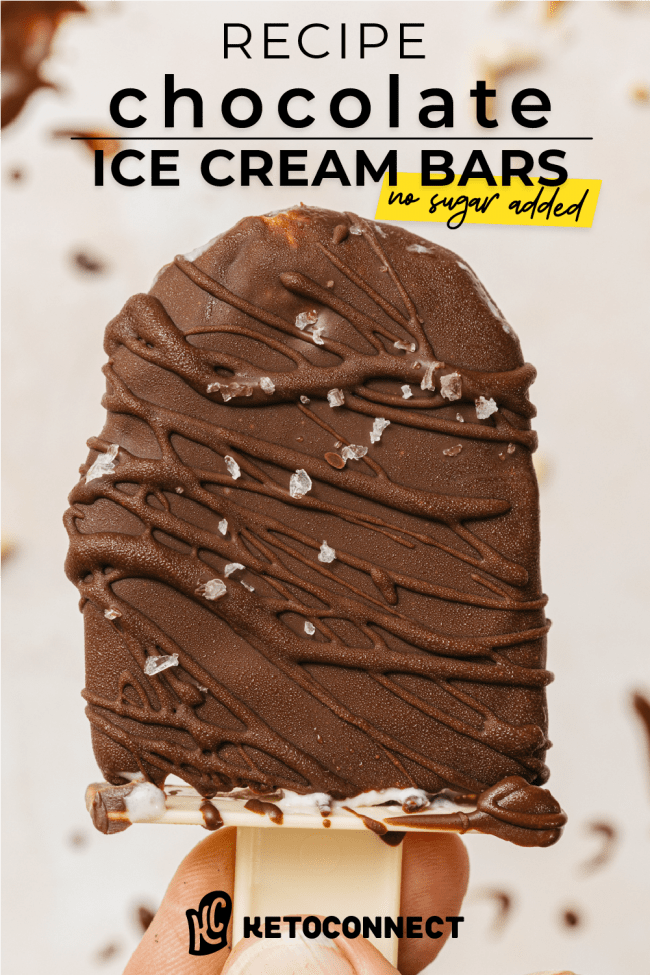Many sugar-free snacks use allulose as an alternative sweetener since it tastes like sugar.
But is allulose keto-friendly, and how does it affect your body?
In this post, I’ll cover if you can eat allulose on keto, some tasty allulose recipes and alternatives.
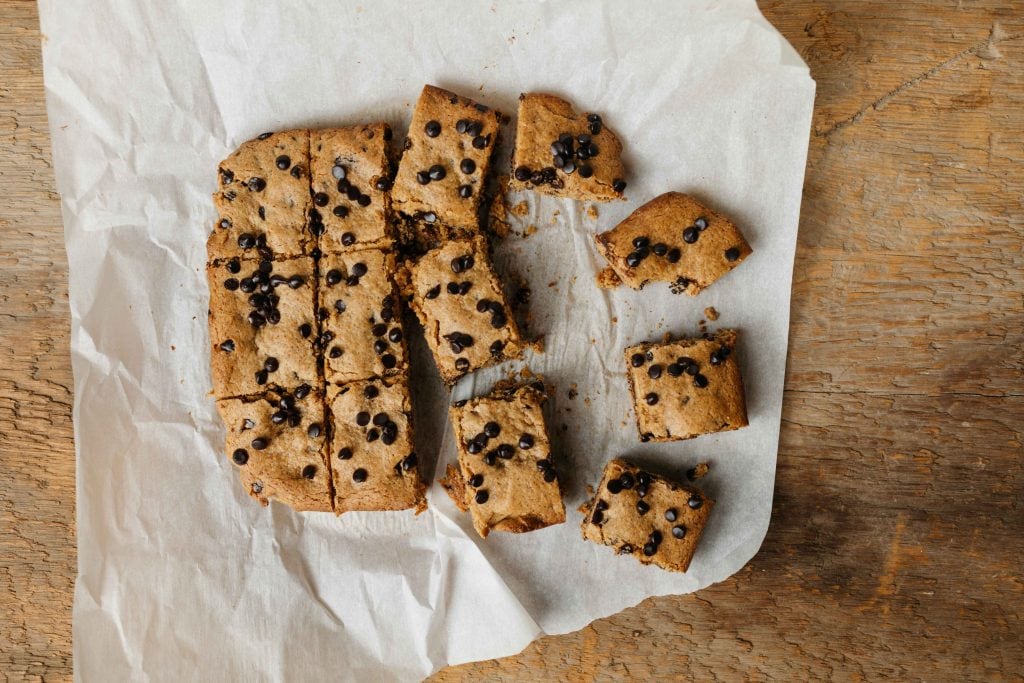
Can You Eat Allulose On A Keto Diet?
You can eat allulose on a ketogenic diet. One teaspoon contains four grams of total carbs, but the net carb count is zero since your body doesn’t absorb it.
Allulose is a rare sugar that’s similar to traditional sugar on a molecular level. In the science community, both are labeled as monosaccharides. And the only difference between the two is your body doesn’t digest allulose, thus not spiking blood glucose and improving insulin sensitivity.
This is why you’ll find allulose in almost all keto treats like cereals, bread, candy, crisps and soda.
Here are some benefits of using this keto sweetener:
- It tastes just like regular table sugar
- Allulose won’t raise blood sugar
- You don’t need a lot to sweeten your coffee
In 2009, the Journal of Metabolism published a detailed study that gave two test subjects, either glucose or allulose. Researchers then measured the exhaled gasses of participants to find how much each sweetener oxidized.
With the allulose subjects, researchers found no change in carbohdrate oxidation. This means allulose has little to no effect on your body.
Most artificial and natural sweeteners cause gastric upset due to the fermentation in your gut and small intestine. But in this study, there was also no fermentation of cellulose in the stomach.
So if you get an upset stomach after eating sweeteners, consider allulose.
Allulose Nutritional Information
According to the FDA, one teaspoon of allulose contains:
- 0.8 to 1.6 calories
- Four total carbs
- Zero net carbs
- Zero protein, fiber or fat
This makes it the perfect sugar substitute for anyone looking to lose weight or manage diabetes. Because of the zero net carb content, allulose has no effect on blood sugar levels.
You could add this low-calorie sweetener to your morning coffee to replace sugar as a healthier alternative. Or, when you’re making keto dessert, consider using allulose. You won’t notice any difference compared to table sugar.
Benefits Of Allulose
Allulose offers a few distinctive health benefits compared to other sugar alcohols and artificial sweeteners.
70% Of Allulose Is Excreted In The Urine
If 70% of it is extracted in the urine, how do you metabolize it?
Well, if something is being excreted in the urine, it means our bodies don’t have the necessary enzymes to use it for fuel. So allulose doesn’t even get metabolized.
The Journal Foods published a study where they put allulose in some gastric juices and let it sit for an hour. They found that 97% of the allulose was still intact.
So if you’re looking for a low-calorie, zero-carb sweetener that doesn’t affect your body negatively, opt for allulose.
It Doesn’t Affect Your Gut Microbiome
One of the biggest problems with consuming an artificial sweetener is its adverse effect on your gut microbiome. Many sweeteners tend to promote the growth of harmful bacteria, creating imbalances.
Unlike fructose, allulose can actually help your gut health.
A 2020 study found that giving mice allulose resulted in a significant increase in short-chain fatty acids, which feed the cells that line your gut. And on a low-carb diet this also boosts ketone production while giving your gut what it needs to thrive.
Another big problem many sweeteners face is it causes weight gain. But the same study found allulose helped the mice lose weight. This is because their body burns calories trying to digest the allulose but lacks the enzymes to do so. This results in a slight caloric deficit which can burn fat and reduce body weight.
Although a lot of these studies were done on mice not humans, the results so far are looking promising.

It Buffers The Carbohydrate Response
The Journal of Nutritional Science and Vitaminolgy published a study in 2008 that found if you consume six tablespoons of allulose alongside some carbohydrates, you significantly reduce plasma, glucose, and insulin levels.
So if you want to indulge in a cheat meal, consider increasing your allulose consumption since it minimizes the harmful effects.
How To Use Allulose On A Ketogenic Diet
Here are some of my favorite ways to consume allulose.
Bulletproof Keto Coffee
Bulletproof coffee is a staple in every keto diet. The caffeine kick gives you an early morning boost, and the MCT oil offers powerful benefits like increased brain function and lowered risk of developing Alzheimer’s Disease.
However, many new keto dieters struggle with the bitter taste due to the lack of sugar. This is where allulose comes in.
Because allulose tastes just like sugar, you’ll still get that sweet taste without the harmful effects.
To make keto coffee, all you need is five ingredients:
- Instant coffee or some coffee beans
- Milk
- Coconut or MCT oil
- Butter
- Allulose
You make it just like you would a regular cup of coffee. But when it’s finished, simply add your MCT oil, butter and allulose and enjoy!

Keto Marshmallows
One of the snacks I missed the most when doing keto is marshmallows since few brands sell marshmallows without added sugars. But with this recipe, you can enjoy marshmallows with the allulose benefits.
To make these gluten-free marshmallows, you’ll need:
- Two tablespoons of gelatin
- One cup of allulose
- One teaspoon vanilla extra
- A pinch of salt
First, add ⅓ of a cup of water to a bowl with your gelatine. Stir and set it aside. Next, get half a cup of water, pour it into a hot pot, and add your allulose. Cook this for two minutes or until it comes to a boil.
Now, take your bloomed gelatin, put it in a large bowl and pour your hot allulose mixture in. Whisk this with an electric beater for 10 minutes and add your salt and vanilla extract.
After 10 minutes, it’ll have an even, thick consistency. Lay it onto a tray, cut into small pieces and enjoy!
Keto Caramel Sauce
This caramel sauce a tasty
- ¼ cup butter
- ½ cup allulose
- ½ cup heavy cream
It also only takes a few minutes to make.
First, add your butter to a heated pot and let it melt. Next, toss in your allulose and whisk until it’s caramelized. This takes around five minutes. Add your cream, whisk the mixture and cook until it thickens.
The last step is to let it cool down, and you can use it to spice up frozen dairy desserts like keto ice cream.
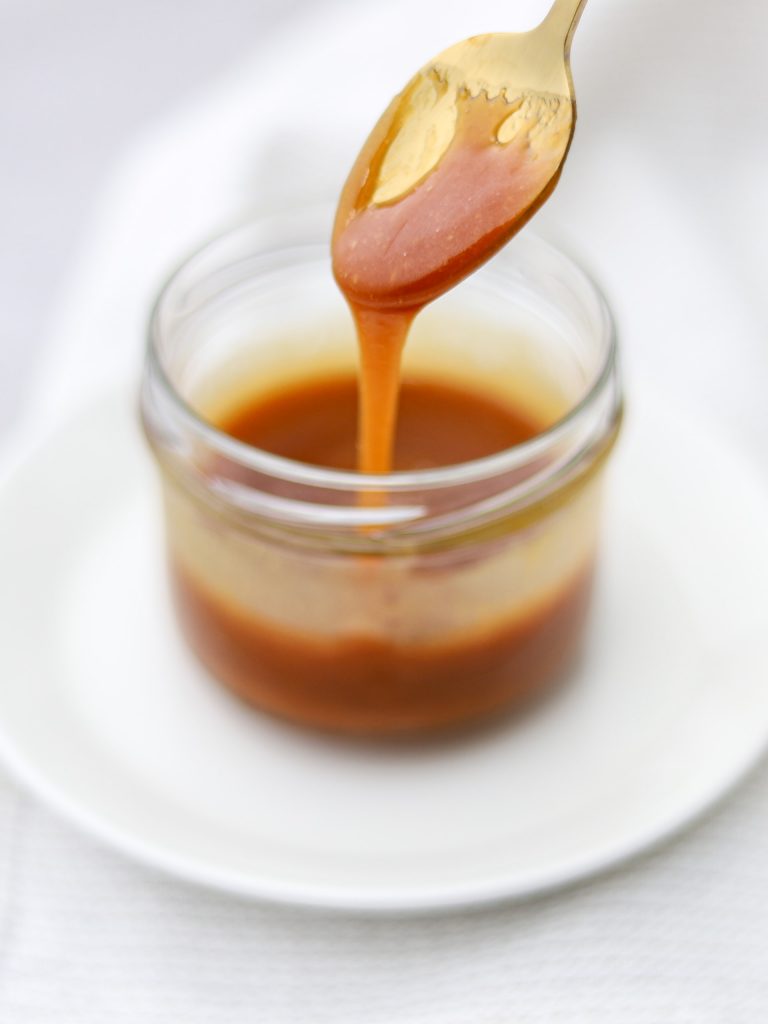
What Are Some Allulose Alternatives?
If you’re looking to add some variety to your keto diet, consider the following sugar alternatives.
Xylitol
Like allulose, xylitol is a natural sweetener that tastes like regular table sugar. With a glycemic index or GI score of seven, it might affect blood sugar a little, especially in large quantities, but it won’t be anything like normal sugar. It also has fewer calories that sugar.
Many brands use it in nasal spray because it prevents harmful bacteria from sticking to the wall of your mucus membranes.
Because xylitol helps with dental cavities, it’s a tasty alternative for children who eat a lot of sugar.
But you want to ensure you’re buying organic, non-GMO xylitol because companies can make xylitol from GMO corn.
Erythritol
Erythritol is a sugar alcohol that is also proven to prevent dental cavities. It’s 70% as sweet as sugar, making it a practical option to add to your morning coffee.
With a GI score of zero, it won’t raise blood glucose or insulin levels.
What’s unique about erythritol is that bacteria can’t consume it. So you won’t experience digestive problems like you would with maltitol, xylitol and stevia.
But many brands that use erythritol in their snacks also use a sweetener called inulin which is known to cause bloating, gas and a laxative effect. So it’s important to read the nutrition labels.
Stevia
Stevia is a calorie-free sugar naturally found in the Stevia rebaudiana plant. It’s a popular replacement for sugar because it’s 100 to 300 sweeter, so you won’t need much to sweeten desserts.
One teaspoon of stevia contains one gram of carb. But it doesn’t have a glycaemic response, so it also won’t spike blood glucose levels.
New research also found stevia can kill the pathogen that causes Lyme disease. In this study, researchers compared stevia to antibiotics like:
- Doxycycline
- Cefoperazone
- Daptomycin
They found that stevia is far better at treating Lyme disease than these antibiotics. The antibiotics actually increased the resistance of the pathogen instead of treating it.
This just shows the power and potential of stevia extract.
Monk Fruit Sweetener
Monk fruit sweetener is another healthy alternative to simple sugar. It contains no carbs and has a GI score of zero, meaning it doesn’t affect blood glucose levels like xylitol.
If you’re making dessert, only use a little because it’s 250 times sweeter than regular sugar.
Monk fruit is high in an antioxidant called mogrosides. Studies find mogrosides can reduce inflammation, keep blood glucose levels low and even prevent cancer. This makes it a powerful alternative to allulose.
The only drawback to monk fruit is the taste. If you’re used to other sugars like xylitol and erythritol, monk fruit might taste weird. It tastes like monk fruit, and the bitter aftertaste can last a while. But once you get used to it, you’ll barely notice it.
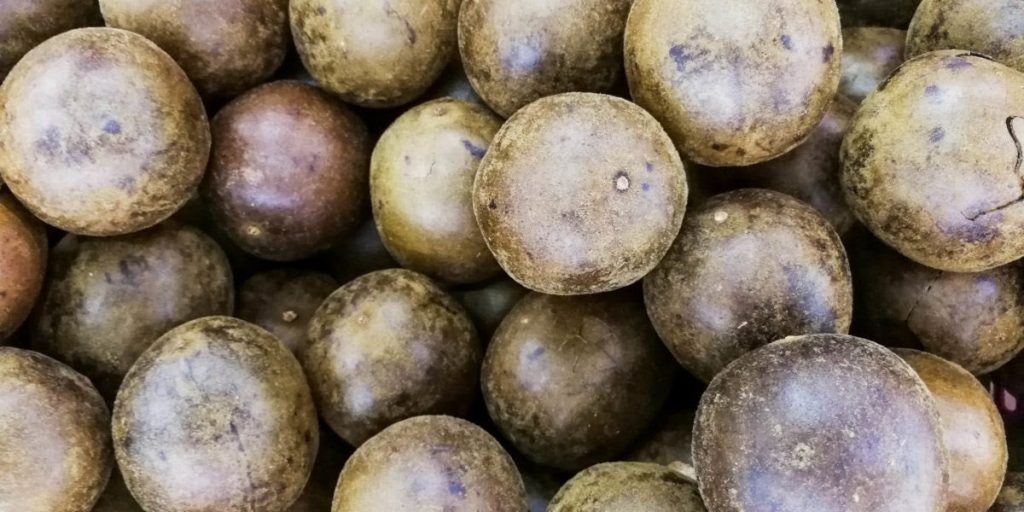
Final Word Eating Allulose Sweetener On Keto
Allulose is a natural keto-friendly sweetener. It won’t affect ketosis, trigger inflammation, or spike blood sugar because our bodies don’t digest it. With zero net grams of carbs, you can use allulose in your morning keto coffee or when making dessert.
Where other sweeteners negatively affect your gut, allulose is found to feed the healthy bacteria that line your stomach. It can even buffer the carb response making it a must-have when eating a cheat meal.
But if you’re looking for other sugar substitutes, consider xylitol, erythritol, monk fruit sweetener or stevia. They all offer their own unique health benefits. Xylitol and erythritol prevent cavities, stevia fights Lyme disease, and monk fruit reduces inflammation.
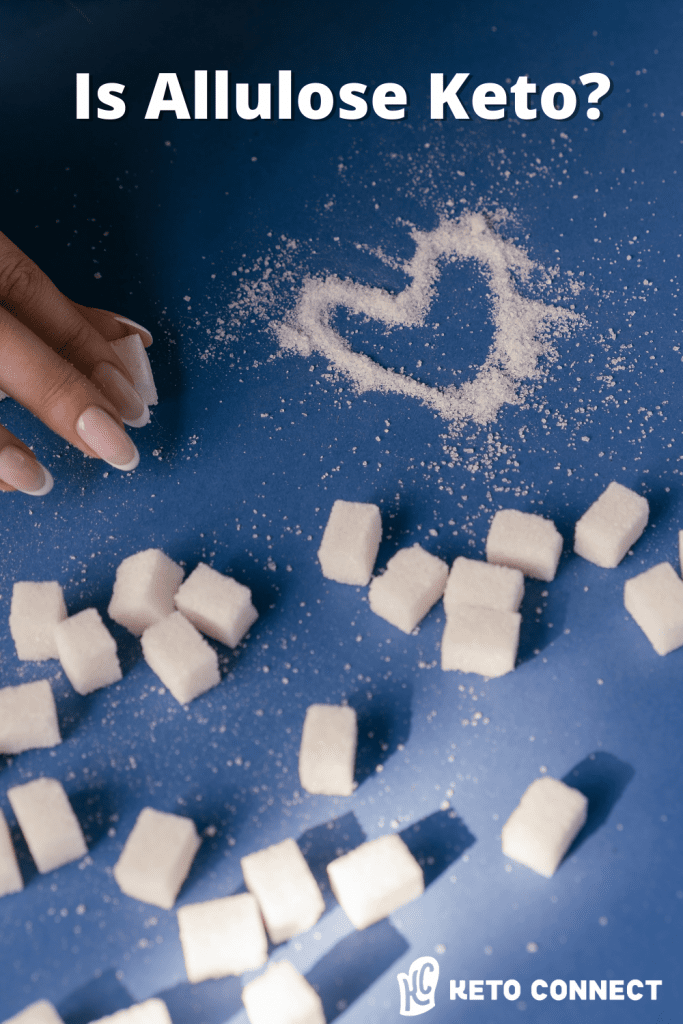
Written by
Matt Gaedke
Matt is a former college basketball player turned computer engineer who discovered his passion for health and nutrition after cutting sugar from his diet in 2016. That year he founded KetoConnect with Megha in order to share their ketogenic lifestyle through recipes, videos, and educational content. Matt is always seeking to grow and try new things, a passion he shares with his wife and two amazing sons.
